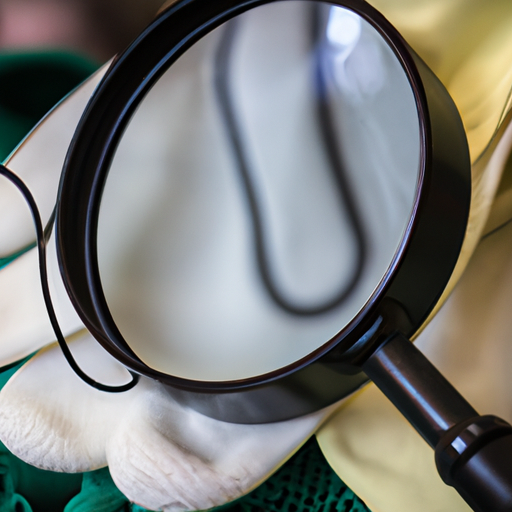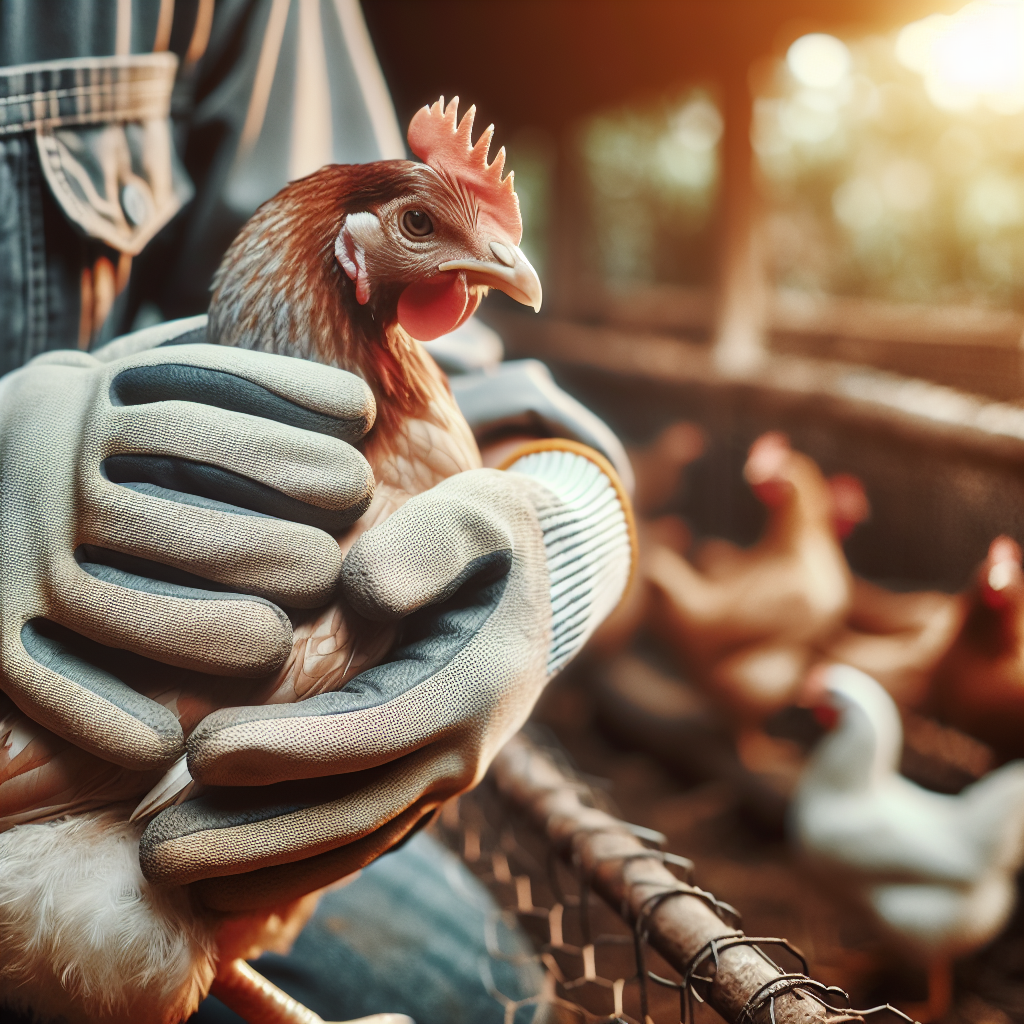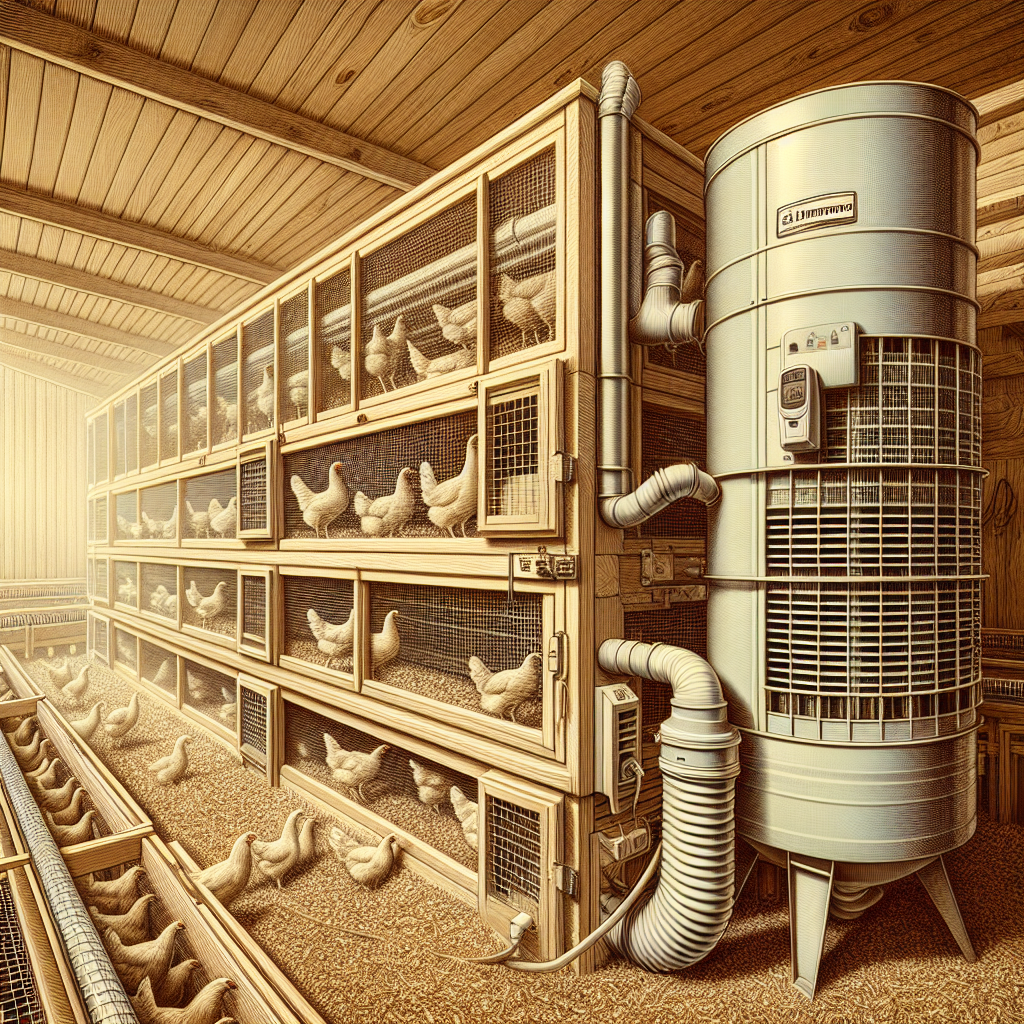Maintaining a healthy and functional coop for your feathered friends is an important responsibility as a poultry owner. To ensure the well-being and safety of your chickens, it is crucial to conduct regular inspections as part of your maintenance routine. But how often should you perform these thorough inspections? In this article, we will explore the ideal frequency for inspecting your coop and provide valuable insights on what to look out for during these inspections. So, grab your notebook and let’s dive into the world of coop maintenance together!
Importance of Regular Inspections
Regular inspections of your chicken coop are essential for various reasons. By conducting inspections on a regular basis, you can prevent damage and costly repairs, ensure the health and safety of your chickens, identify and address maintenance issues, detect pest infestations, and monitor environmental conditions.
Preventing Damage and Costly Repairs
Regular inspections allow you to identify and address any potential issues before they worsen and cause significant damage to your chicken coop. By proactively inspecting your coop, you can address issues such as roof leaks, structural damage, and wear and tear on equipment or infrastructure. Taking care of these small issues in a timely manner can save you from expensive repairs in the future and extend the overall lifespan of your coop.
Ensuring Health and Safety of Chickens
A well-maintained chicken coop is crucial for ensuring the health and safety of your feathered friends. Regular inspections allow you to monitor the condition of the coop, including its cleanliness and ventilation. By keeping a close eye on these factors, you can prevent the buildup of harmful bacteria or mold, maintain good air quality, and create a comfortable environment for your chickens.
Identifying and Addressing Maintenance Issues
Regular inspections help you stay proactive in identifying and addressing maintenance issues in your chicken coop. This includes checking for loose or damaged wiring, addressing any flooring or bedding needs, and inspecting the overall structural integrity of the coop. By addressing these issues promptly, you can prevent accidents and create a safe living space for your chickens.
Detecting Pest Infestations
Pests can cause significant harm to your chickens and the overall structure of your coop. Regular inspections allow you to keep an eye out for signs of pest infestations, including droppings, chewed materials, or evidence of nests. By promptly detecting and addressing these infestations, you can prevent the spread of diseases and protect your chickens from harm.
Monitoring Environmental Conditions
Environmental conditions, such as temperature and humidity, can greatly impact the well-being of your chickens. Regular inspections allow you to monitor these conditions and make any necessary adjustments, such as ensuring proper ventilation or providing adequate insulation during colder months. By maintaining optimal environmental conditions, you can promote the health and productivity of your chickens.
Factors Influencing Inspection Frequency
While regular inspections are important, the frequency at which you conduct them may vary depending on several factors. These factors can include the number of chickens in your coop, the size and design of the coop, the location and climate of your area, the usage and activity level of the coop, any past incidents or issues, and the presence of predators.
Number of Chickens
The number of chickens in your coop can influence the frequency of inspections. Generally, the more chickens you have, the higher the likelihood of wear and tear, potential damage, and the need for more frequent inspections. This is especially true if your coop is crowded or if you have a high turnover of chickens.
Coop Size and Design
The size and design of your coop can also impact how often inspections should occur. Larger coops may require more thorough inspections due to the increased surface area and potential for hidden issues. Additionally, the design of your coop, such as the presence of intricate wiring or plumbing, may require more frequent inspections to ensure everything is in working order.
Location and Climate
The location and climate of your area can affect the frequency of inspections. If you live in an area prone to extreme weather conditions, such as heavy rain or snow, you may need to inspect your coop more often to identify any potential damage or leaks. Similarly, if you live in an area with a high prevalence of pests, more frequent inspections may be necessary to catch and address infestations.
Usage and Activity Level
The way you use your chicken coop and the activity level of your chickens can influence inspection frequency. If your coop is heavily used, such as for breeding or egg production, you may need to conduct more frequent inspections to ensure the equipment and infrastructure are functioning properly. Additionally, if your chickens have access to outdoor runs, you may need to inspect the fencing and surrounding area for any signs of wear or potential predator threats.
Past Incidents or Issues
If you have experienced past incidents or issues with your coop, such as water damage or predator attacks, it is crucial to conduct more frequent inspections. These inspections can help you identify any lingering issues or potential vulnerabilities that may need extra attention. By staying proactive, you can prevent the reoccurrence of these incidents and keep your chickens safe.
Presence of Predators
If you live in an area with a high presence of predators, such as raccoons or foxes, it is important to increase the frequency of your inspections. Regularly checking for signs of predator activity, ensuring the security of your coop, and making any necessary repairs or upgrades are essential to protect your chickens from harm.
General Guidelines for Inspection Frequency
While the specific frequency of inspections will depend on the factors mentioned above, there are some general guidelines that can help you establish a regular inspection schedule. These guidelines include weekly inspections, monthly inspections, seasonal inspections, and annual inspections.
Weekly Inspections
Performing weekly inspections allows you to stay on top of any immediate issues or changes in your chicken coop. During these inspections, you should focus on examining the exterior of the coop for signs of wear and tear, checking the perches and roosting bars for stability, inspecting ventilation and air quality, monitoring food and water storage conditions, and cleaning nesting boxes.
Monthly Inspections
Monthly inspections provide an opportunity for more thorough cleaning and maintenance tasks. During these inspections, you should prioritize a thorough cleaning of the coop, including removing any built-up bedding or debris. Additionally, check for structural integrity, inspect wiring and lighting, examine flooring and bedding conditions, and assess the overall security measures in place.
Seasonal Inspections
Seasonal inspections are critical for preparing your coop for changing weather conditions and addressing specific seasonal issues. For example, before winter arrives, you should inspect the roof and gutters for any damage or leaks, address pest control measures to prevent infestations during colder months, check for water damage or potential insulation needs, and evaluate the overall insulation of your coop.
Annual Inspections
Annual inspections allow for a comprehensive review of your coop’s overall health and performance. During these inspections, you should thoroughly examine the coop foundation, assess the overall structural integrity, inspect perimeter fencing for any weaknesses, review your maintenance schedule to identify any recurring issues, and plan for any necessary upgrades or renovations in the coming year.
Signs That Require Immediate Inspection
While regular inspections are crucial, there are certain signs that should never be ignored and require immediate inspection. These signs include unusual behavior in chickens, the presence of strong odors, visible signs of damage to the coop, water leakage or moisture issues, evidence of predators, and a sudden decrease in egg production.
Unusual Behavior in Chickens
If you notice any abnormal behavior in your chickens, such as decreased appetite, lethargy, aggression, or unusual vocalizations, it is essential to conduct an immediate inspection. Unusual behavior can be an early indication of health issues, stress, or potential predator threats. By addressing these issues promptly, you can prevent further harm to your chickens.
Presence of Strong Odors
Strong and unpleasant odors coming from your coop can indicate poor ventilation, a buildup of waste, or the presence of mold or bacteria. These issues can be harmful to your chickens’ health and should be investigated immediately. By identifying and resolving the source of the odor, you can create a cleaner and healthier environment for your chickens.
Visible Signs of Damage
If you notice visible signs of damage to your coop, such as holes in the walls, broken windows, or sagging roofing, it is crucial to conduct an immediate inspection. These signs of damage can compromise the structural integrity of your coop, create vulnerabilities for pests or predators, and may require immediate repairs to prevent further deterioration.
Water Leakage or Moisture Issues
Water leakage or excessive moisture in your coop can lead to mold growth and other water-related damage. If you observe any water leakage or excessive moisture, such as wet bedding or dripping ceilings, it is important to investigate and address the issue promptly. Ignoring water-related problems can lead to rotting wood, compromised insulation, and potential health hazards for your chickens.
Evidence of Predators
If you find any evidence of predators, such as tracks, droppings, or damage to the coop or fencing, immediate inspection is necessary. Predators pose a significant threat to the safety of your chickens, and prompt action is required to prevent further attacks. Inspecting the perimeter fencing, reinforcing weak spots, and implementing additional security measures can help protect your chickens from harm.
Sudden Decrease in Egg Production
A sudden decrease in egg production can be an indication of underlying health issues or stress among your chickens. Conducting an immediate inspection can help identify any potential problems, such as diseases or nutritional deficiencies, which may be impacting egg production. Addressing these issues promptly can help restore your chickens’ health and productivity.
Creating a Maintenance Schedule
To ensure the effectiveness of your inspections, it is helpful to create a maintenance schedule. This schedule helps you set priorities, allocate timeframes, keep a detailed inspection log, assign responsibilities, consider outsourcing professional inspections, and plan and budget for maintenance.
Setting Priorities and Timeframes
Prioritize your inspection tasks based on their urgency and importance. Determine how frequently different areas or aspects of your coop need to be inspected, and allocate specific timeframes for each inspection. By setting priorities and timeframes, you can ensure that all necessary inspections are carried out in a timely manner.
Keeping a Detailed Inspection Log
Maintaining a detailed inspection log can help you track the history of your coop’s maintenance, identify recurring issues, and monitor the effectiveness of your inspections. Keep a record of each inspection, including the date, specific tasks performed, any issues or findings, and the actions taken to address them. This log serves as a valuable reference and helps you stay organized in your coop’s maintenance efforts.
Assigning Responsibilities
If you have multiple people involved in the care and maintenance of your coop, it is important to assign specific responsibilities for inspections. Delegate tasks to different individuals based on their strengths and availability. Clearly communicate expectations and ensure that everyone understands their roles and responsibilities in conducting regular inspections.
Considering Outsourcing Professional Inspections
In some cases, it may be beneficial to outsource certain inspections to professionals, especially if you lack the necessary expertise or resources. Professional inspections can provide a more thorough assessment of your coop’s condition and help identify any potential issues that may have been overlooked. Consider outsourcing inspections, such as electrical or plumbing checks, to ensure the safety and functionality of your coop.
Planning and Budgeting for Maintenance
Regular inspections often lead to various maintenance tasks and repairs. It is crucial to plan and budget for these expenses in order to maintain the longevity and functionality of your coop. Consider allocating a portion of your budget for routine maintenance tasks, such as replacing worn-out equipment, repairing structural damage, or implementing necessary upgrades. By planning and budgeting for maintenance, you can avoid unexpected financial burdens and ensure the ongoing well-being of your coop and chickens.
Conclusion
Regular inspections are of utmost importance when it comes to maintaining a healthy and well-functioning chicken coop. By conducting inspections at appropriate frequencies, you can prevent damage and costly repairs, ensure the health and safety of your chickens, identify and address maintenance issues, detect pest infestations, and monitor environmental conditions.
By considering factors such as the number of chickens, coop size and design, location and climate, usage and activity level, past incidents or issues, and the presence of predators, you can determine the appropriate inspection frequency for your specific situation. Weekly, monthly, seasonal, and annual inspections serve different purposes and allow you to address specific aspects of your coop’s maintenance.
Certain signs, such as unusual chicken behavior, strong odors, visible damage, water leakage or moisture issues, evidence of predators, and sudden decreases in egg production, require immediate inspection to prevent further harm to your chickens and the coop.
Creating a maintenance schedule, setting priorities and timeframes, keeping a detailed inspection log, assigning responsibilities, considering professional inspections, and planning and budgeting for maintenance are all essential in ensuring the longevity and functionality of your coop.
Remember, prevention is key to avoiding issues and maintaining a healthy and happy coop for your beloved chickens. Regular inspections are an investment in the well-being of your chickens, and by staying on top of maintenance, you can create a safe and comfortable environment that promotes their overall health and productivity.




